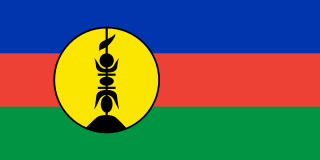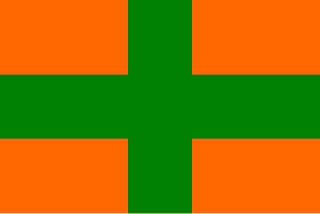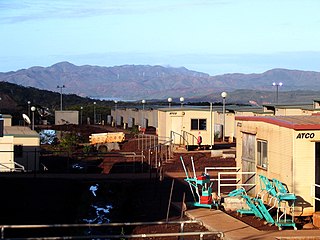
New Caledonia is a French sui generis collectivity with a system of government based on parliamentarism and representative democracy. The President of the Government is the head of government, and there is a multi-party system, with Executive power being exercised by the government. Legislative power is vested in both the government and the Congress of New Caledonia. The judiciary is independent of the executive and the legislature.

The Kanak and Socialist National Liberation Front is a pro-independence alliance of political parties in New Caledonia. It was founded in 1984 at a congress of various political parties. Its supporters are mostly from the Kanak indigenous population but also include supporters from other ethnic communities.

The Caledonian Union is a pro-independence and the oldest political party in New Caledonia. In the latest legislative elections of May 10, 2009, the party won around 11.65% of the popular vote, and 9 out of 54 seats in the Territorial Congress.
The Federation of Pro-Independence Co-operation Committees is a political party in New Caledonia supporting the island's independence from France, although it is the most moderate of all nationalist parties.
The Kanak Socialist Liberation is a Kanak pro-independence and socialist political party in New Caledonia.
The Renewed Caledonian Union is a political party in New Caledonia formed by dissidents from the Caledonian Union. It is a member of the National Union for Independence (UNI) coalition, which is in turn a member of the Kanak and Socialist National Liberation Front (FLNKS).
The Nouméa Accord of 1998 is a promise by the French Republic to grant increased political power to New Caledonia and its original population, the Kanaks, over a twenty-year transition period. It was signed 5 May 1998 by Lionel Jospin, and approved in a referendum in New Caledonia on 8 November, with 72% voting in favour. Under the accord, two more referendum votes, on whether to remain a special collectivity of France or become an independent state, have been held. One was held in 2018, and the second was held in 2020. In both votes a majority chose to remain French. The Nouméa Accord permitted a final referendum to be held, voted for by the Congress of New Caledonia. It was held December 2021 and widely rejected independence amid boycott by the independence movement.

Two flags are in use in New Caledonia, an overseas territory of France. Up to 2010, the only flag used to represent New Caledonia was the flag of France, a tricolour featuring three vertical bands coloured blue, white, and red known to English speakers as the French Tricolour or simply the Tricolour. However, in July 2010, the Congress of New Caledonia voted in favour of a wish to fly the Kanak flag of the independence movement FLNKS alongside the French Tricolour. The wish, legally non-binding, proved controversial. A majority of New Caledonian communes, but not all, now fly both flags, the rest flying only the French Tricolour.

Loyalty Islands Province is one of the three top-level administrative subdivisions of New Caledonia. It encompasses the Loyalty Islands archipelago in the Pacific Ocean, located northeast of the New Caledonian mainland of Grande Terre.

The National Union for Independence is a militant socialist pro-independence alliance of political parties in New Caledonia. It is a component of the Kanak Socialist National Liberation Front (FLNKS) along with the Caledonian Union.

Legislative elections were held in New Caledonia on 11 May 2014. The result was a victory for the three anti-independence parties, which together won 29 of the 54 seats in the Congress of New Caledonia.

An independence referendum was held in New Caledonia on 4 November 2018. Voters were given the choice of remaining part of France or becoming an independent country.
Legislative elections were held in New Caledonia on 8 February 1953.

An independence referendum was held in New Caledonia on 4 October 2020. The poll was the second to be held under the terms of the Nouméa Accord, following a similar referendum in 2018.
Legislative elections were held in New Caledonia on 11 September 1977. Anti-autonomy parties won 19 of the 35 seats.
Legislative elections were held in New Caledonia on 18 November 1984. They had originally been planned for July, but were postponed due to threats by the Independence Front to boycott and disrupt the vote. Most members of the Front subsequently merged into the Kanak and Socialist National Liberation Front in September, and proceeded to boycott the elections. As a result, the Rally for Caledonia in the Republic won 34 of the 42 seats in a landslide victory. Following the elections, Dick Ukeiwé became President of the Government.
Early legislative elections were held in New Caledonia on 29 September 1985. They were called after the 1984 elections had been boycotted by the pro-independence Kanak and Socialist National Liberation Front (FLNKS) and were marred by violence that continued for several weeks after election day.

The 2020 protests in New Caledonia began on 28 October 2020 over a plan to sell a Vale-owned nickel and cobalt mine to a consortium led by Trafigura. The nickel mine and plant is known as the Goro mine. Independence leaders and pro-independence protesters wanted for the nickel plant to be owned by citizens of New Caledonia rather than foreign investors, though various arrangements have been proposed.
An independence referendum was held in New Caledonia, a French territory in the South Pacific, on 12 December 2021. The poll was the third and final to be held under the terms of the Nouméa Accord, following votes in 2018 and 2020, in which independence was rejected by 56.7% and 53.3% respectively.
Caroline Machoro-Reignier is a Kanak politician in New Caledonia. A member of the pro-independence Caledonian Union, she led the Kanak and Socialist National Liberation Front alliance in the Congress of New Caledonia from 2011 to 2014. In 1988, she was one of the signatories of the Matignon Agreements between New Caledonian loyalists and separatists.










